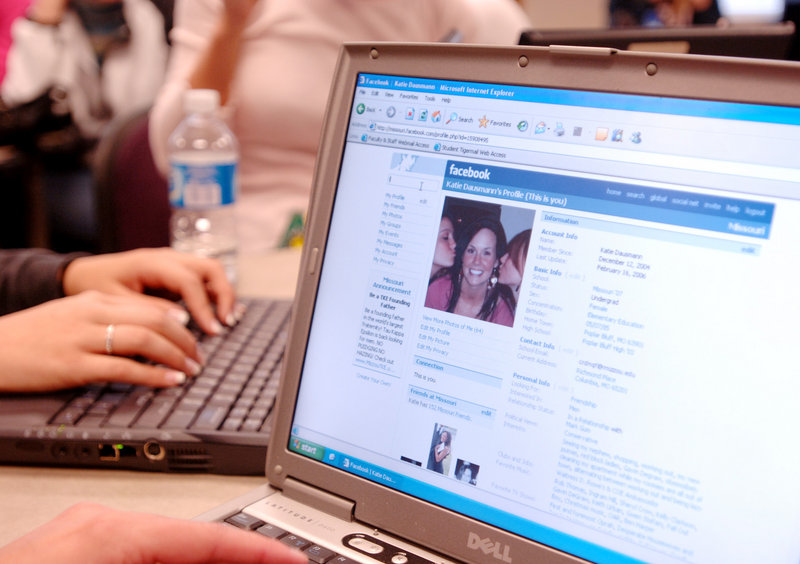ORONO – What disturbs me about the Oxford Hills Comprehensive High School coach who recently resigned after posting a nude photo of himself on Facebook is not the photo.
I am sure that the photo would disturb me if I looked at it, but, since I teach a class at the University of Maine called Computers, Ethics and Society, it’s the clarion call for the coach’s resignation that is most disturbing. This is wrong for four reasons:
• First, we should in general adhere to the principle, “No harm, no foul.”
The coach’s excuse — that he didn’t understand Facebook’s new privacy settings and intended for only his girlfriend to see the photo — is practically irrefutable.
No one denies that the photo was up for only 10 minutes. Apparently, a parent found it, probably because friends get to see whatever friends do on Facebook, a feature that has frustrated many.
While it is unclear why an adult would want to “friend” students on Facebook, the simple fact is that Robin Williams’ endearing character in “Dead Poets Society” would, if he were living today, do just that.
• Second, a football coach should not be fired for mishandling Facebook outside of school.
Facebook has nothing to do with the coach’s job. A coach should resign only when he misbehaves on the job. He should be able to post whatever he wants, subject to the law.
After all, he could just as easily fall flat on his face stumbling out of a bar at 2 a.m. on a Saturday, but we understand that that is his own business; only entering the school drunk is the school’s business.
• Third, neither the coach nor his photo — which no student would have seen, had a parent not made a big deal about it — poses a threat to anyone. He was a coach of a football team, not a girls’ gymnastics team.
Indeed, his explanation of the incident confirms that he’s not likely to want to “horse around” with the players in the shower, like the accused Penn State assistant coach. And, frankly, any high school football player worth his salt could and would beat the living daylights out of the coach if he tried.
In America, there is a trend that everyone is treated as a serial killer until proven otherwise. And, just like Pavlov’s dogs, we begin to brutalize each other without having good reason to.
For example, in Maine, prospective teachers must be fingerprinted, something formerly reserved only for people under arrest. But this policy makes no sense, unless a prospective teacher was also once a careless cat burglar. You usually don’t leave fingerprints when you molest someone.
Moreover, American school systems are quite inconsistent in this regard.
For instance, New York City, one of the biggest school districts in the country, has hired a self-professed drug dealer, thief and virtual-attempted murderer at a salary of between $170,000 and $195,000. Their theory, I assume, is that one can be an ex-cat burglar and a great chemistry teacher.
• Fourth, and finally, I can’t figure Facebook out, either, and I’m a professor of computing.
The site’s privacy controls change all the time and really are quite complicated. I have written computer programs since I was 9, and I cannot figure out how to put a “wall” photo in the strip at the top of the screen without re-posting it.
I am sure there are photos of me on Facebook that the general public could see without my meaning for them to. Of course, mine are all kid-friendly — although there is that photo of a 19-year-old seemingly passed out on my shoulder in a club in Austria, which I found on her Facebook page. But I think she was just tired.
In conclusion, the government must pass laws prohibiting employers from using social networking websites in employment decisions. While it is impossible for such a law to have teeth, we must establish the ethic in this society that, even though cameras watch us constantly, we retain the freedom to do as we will — subject, of course, to the terms and conditions of the social contract — on our own time.
Jonathan David Farley is a professor of computing and information science at the University of Maine.
Send questions/comments to the editors.



Success. Please wait for the page to reload. If the page does not reload within 5 seconds, please refresh the page.
Enter your email and password to access comments.
Hi, to comment on stories you must . This profile is in addition to your subscription and website login.
Already have a commenting profile? .
Invalid username/password.
Please check your email to confirm and complete your registration.
Only subscribers are eligible to post comments. Please subscribe or login first for digital access. Here’s why.
Use the form below to reset your password. When you've submitted your account email, we will send an email with a reset code.